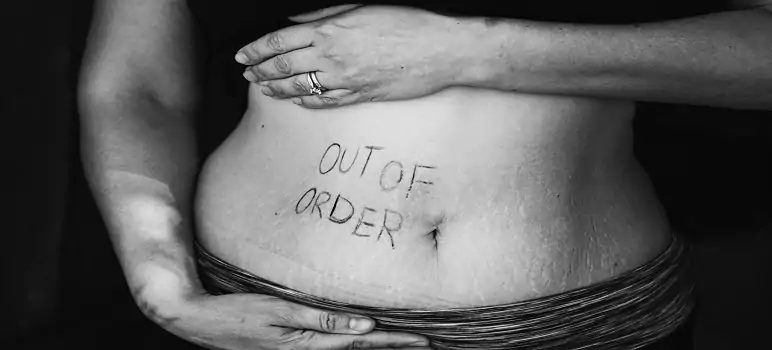Main Causes of Diarrhea and Treatment in adults and children: It’s one of the most uncomfortable and inconvenient health issues out there. What the meaning of Diarrhea is a sign that your body isn’t functioning properly. When you have diarrhea, excess fluids from inside your digestive tract leak through the wall of your intestines and into your bloodstream.
In other words, when you have diarrhea, you have more water than normal in your colon. This leads to an accelerated shedding of excess bacteria and undigested food as well as an increase in the volume of stool that comes out when you go to the bathroom.

What is diarrhea a sign of- What the diarrhea mean?
What is diarrhea a symptom of: Stool is a common part of your life, whether you call it going to the bathroom, having a bowel movement, or pooping. However, your body’s method of eliminating waste can sometimes change. Diarrhea is defined by loose or watery stools. This is a relatively common ailment, and it normally goes away on its own.
There are many different causes of diarrhea, and it generally goes away on its own in one to three days. When you have diarrhea, you can feel the urge to use the restroom immediately and more frequently than usual. Additionally, you can feel bloated, get cramps in your lower abdomen, and occasionally feel nauseous.
Types of Diarrhea- What the meaning of diarrhea
- Acute diarrhea
Loose, watery diarrhea that lasts one to two days is the most typical type of acute diarrhea. This kind normally goes gone within a few days and doesn’t require treatment.
- Persistent diarrhea
Two to four weeks are typical for this form of diarrhea to last for several weeks.
- Chronic diarrhea
Chronic diarrhea is defined as a case of diarrhea that lasts more than four weeks or recurs often over an extended period of time.
You may also like:
- What are the causes of lower back pain- Symptoms, Treatments
- 8 Most Common Causes of Urinary Tract Infections – Risk Factors & Prevention
Diarrhea Symptoms
Depending on how severe or mild your diarrhea is, as well as its underlying cause, you may suffer a variety of symptoms. A medical problem that needs to be treated is connected to severe instances of diarrhea.
You might encounter some or all of these signs and symptoms when you have diarrhea. The primary sign of diarrhea is watery or loose stools.
- Cramps or pain in the abdomen
- Bloating
- Nausea
- Vomiting
- Fever
- There is blood in the stool
- There is mucus in the stool
- You are urgently require a bowel movement
Main Causes of Diarrhea in children and adults
What are the Causes of Diarrhea in Children
- Infection caused by bacteria.
- Infection with a virus.
- Certain things are difficult to digest (food intolerance).
- A reaction of the immune system to certain foods (food allergy).
- Invading parasites that enter the body via food or water.
- Reaction to medication
- Inflammatory bowel disease is an example of an intestinal disease.
- A problem with the function of the stomach and bowels (functional bowel disorder), such as irritable bowel syndrome.
- Stomach or gallbladder surgery.
Causes of Diarrhea in Adults
Diarrhea can be caused on by a number of diseases, including:
- Parasites and bacteria
Diarrhea results from exposure to parasites or harmful bacteria like E. coli through tainted food or drink. In poor nations, diarrhea brought on by bacteria and parasites is frequently referred to as traveler’s diarrhea.
Another type of bacterium that can cause diarrhea is Clostridioides difficile, generally referred to as C. diff. It can happen after an antibiotic course or while you’re in the hospital.
- Viruses
Norwalk virus, also known as the norovirus, enteric adenoviruses, astronaviruses, cytomegaloviruses, and viral hepatitis are some of the viruses that can cause diarrhea. The most typical cause of severe childhood diarrhea is rotavirus. GI symptoms like nausea, vomiting, and diarrhea have also been linked to the virus that causes coronavirus illness 2019 (COVID-19).
- Medications
Numerous drugs, including antibiotics, might make you dizzy. Antibiotics kill harmful bacteria to treat infections, but they also eliminate beneficial bacteria. This upsets the normal bacterial balance in your intestines, which can cause diarrhea or an additional illness like C. diff. Anti-cancer medications and antacids containing magnesium are additional medications that cause diarrhea.
- Intolerance to lactose
A sugar called lactose is present in milk and other dairy products. Lactose intolerance causes diarrhea in those who consume dairy products. Because levels of the enzyme that aids in the digestion of lactose decline as you age, lactose intolerance may worsen.
- Fructose
Honey and fruits contain the naturally occurring sugar fructose. It is occasionally used to sweeten various beverages. In those who struggle to digest it, fructose can cause diarrhea.
- Artificial sweeteners
Some otherwise healthy persons may get diarrhea after consuming the artificial sweeteners sorbitol, erythritol, and mannitol, which are nonabsorbable sugars used in chewing gum and other sugar-free goods.
- Other digestive issues
IBS, Crohn’s disease, ulcerative colitis, celiac disease, microscopic colitis, and small intestinal bacterial overgrowth are only a few of the additional reasons of chronic diarrhea (SIBO).
- Surgery
Diarrhea can occasionally result from surgery to remove the gallbladder or part of the intestine.
You may also like:
- 6 Causes of Hair Loss in Women and How to Prevent Them!
- What are Causes of Depression- How to deal with it?
Treatment for Diarrhea

The majority of the time, diarrhea that is mild and simple can be treated at home. You’ll typically feel better fairly quickly if you use an over-the-counter medication like bismuth subsalicylate (Pepto-Bismol® or Kaopectate®).
Over-the-counter drugs aren’t always the answer, though. You must seek medical attention for treatment if an infection or parasite is the cause of your diarrhea. In general, if you also have a fever or blood in your stool, you shouldn’t take over-the-counter medicines for diarrhea. Call your healthcare provider in those situations.
Your doctor will treat you for the underlying cause if your diarrhea lasts for a long time (a few weeks). This could entail a variety of therapeutic approaches, such as:
Antibiotics
To treat an infection or parasite that is the source of the diarrhea, your doctor may advise taking an antibiotic or other medication.
Medicine for a particular condition
Irritable bowel syndrome (IBS), inflammatory bowel diseases (IBD) like Crohn’s disease and ulcerative colitis, microscopic colitis, and bacterial overgrowth are just a few of the various medical illnesses that can cause diarrhea. Usually, diarrhea can be controlled if the cause has been found.
Probiotics
Probiotics, which are collections of beneficial bacteria, are occasionally used to restore a healthy biome and treat diarrhea. Specific healthcare professionals believe it’s worthwhile to try probiotic introduction because it can be beneficial in some circumstances. Before beginning a probiotic or any other type of supplement, always with your healthcare professional.
How to treat child’s acute diarrhea?
For infants, toddlers, and young children, over-the-counter medications to treat acute diarrhea in adults can be harmful. Before giving your child any over-the-counter medication, consult a professional. See a doctor as soon as possible if your child’s diarrhea persists for longer than 24 hours.
Give your child his or her regular, developmentally appropriate diet. You can continue to feed your baby formula or breast milk as usual.
How to prevent diarrhea- How do U stop diarrhea?
You can reduce your chances of getting diarrhea by doing the following:
- Keeping yourself clean will help you stay healthy
The most effective technique to prevent diarrhea is to wash your hands with soap and water after using the restroom and before cooking, handling, and eating. Washing your hands thoroughly can make a significant difference in the health of both you and others around you.
- Obtaining your vaccines
The rotavirus vaccine can stop rotavirus, one of the causes of diarrhea. Throughout their first year of life, babies receive this at various intervals.
- Proper food storage
You may prevent diarrhea by storing your food at the proper temperatures, avoiding spoiled food, preparing food to the necessary temperature, and handling all meals carefully.
- When travelling, be careful what you drink:
When you consume water or other beverages that haven’t been properly treated, you run the risk of developing traveler’s diarrhea. The likelihood of this occurring is highest in emerging nations. There are certain guidelines to follow in order to avoid experiencing diarrhea. Observe what you consume.
Never consume unpasteurized milk, milk products, or juices, use tap water to make ice cubes, wash your hands with tap water, or brush your teeth with it. Attempting local cuisine from street vendors, consuming raw or undercooked meats (including seafood), as well as eating raw fruits and vegetables, should all be done with caution. Drink bottled water or something that has been previously boiled if you’re unsure (coffee or tea).
You may also like:
- Causes of Gout Disease- Symptoms, Low-Cost Gout Treatment
- 12 Most Common Causes of Kidney Stones and How They Are Treated
Home remedies to treat diarrhea- Treatment of diarrhea
- Normally, diarrhea goes away on its own within a short while. Try the following to manage your symptoms until the diarrhea subsides to help you:
- Drink a lot of liquids, such as juices, broths, and water. Avoid alcohol and caffeine.
- As your bowel motions become regular again, gradually introduce semisolid and low-fiber foods. Try toast, eggs, rice, soda crackers, or chicken.
- For a few days, stay away from certain foods such dairy products, fatty foods, foods heavy in fibre, and foods with a lot of seasoning.
FAQs (Frequently asked questions)
What are 3 causes of diarrhea?
1) Parasites and bacteria
2) Viruses
3) Intolerance to lactose
What are the 4 types of diarrhea?
1) Secretory diarrhea
2) Osmotic diarrhea
3) Motility-related diarrhea
4) Collagenous colitis